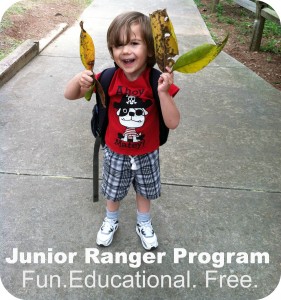Junior Ranger Program: Fun, Educational and Free
May 25, 2013
The Junior Ranger Program. Really, does it get much better than fun, free (mostly) and educational?
This program, hosted by a series of national and state parks, is an exciting way for your kids to learn the environmental and historical aspects of your region. If you are anything like me, you have seen posts about the Junior Ranger Program on various blogs. I’ve seen friends write about it on Facebook, too. But only a few weeks ago did I stop g l a n c i n g over these references; I finally clicked a link and did the research. Gold Mine! We’ve heard from moms that they want something exciting for the summer that will keep their kid’s minds active, but that won’t break the bank; the Junior Ranger Program is the answer.
In a nutshell, the Junior Ranger Program encourages kids to perform activities ranging from outdoor scavenger hunts to scramble word-finds, from volunteering to bird-watching, and much more. Once prospective Jr. Rangers complete a set number of experiences at home and within a park setting, then they share their findings with a Park Ranger in order to receive a badge, patch, or certificate (depending on the program and location.) The program is usually available via the park’s website, and is self-directed. This means you and your kids set the pace, select the activities and manage your own goals.
The program originated with the National Parks Service. Almost National Parks, National Monuments, and National Historical Sites have their own, specific program. For example, if you live in Arizona then you may enjoy the program for Petrified Forest National Park, and if you are traveling to DC then consider the program for the National Mall.
Most states also have a Junior Ranger Program for the state parks system, such as our program in Georgia. Other states such as North Carolina have a state program, but also have additional programs for specific state parks like Weymouth Woods – Sandhills Nature Preserve. You can also find specialty programs at the national and state level. For example, Georgia offers the Junior War Historian Program; the National Parks System also offers Junior Paleontologist and Night Explorers programs.
I have not found a directory of all the state programs; I would recommend Googling your state park system and the term “Junior Ranger.” In addition to the program booklet, you may also find newsletters, Junior Ranger Camps (usually these require a fee), Junior Ranger family outings, and more.
Tips for starting the program
Each program indicates a recommended age; most fall between 5 and 12 years old. There are a handful of programs for kids as young as 2 yrs and as old as 17 yrs. I encourage you to look through the program contents rather than settle on the recommended age. I almost did not start the program with my son this year. The recommended level 1 age for Georgia is 6 yrs. However, after reviewing the material, I would say he could have started at 3 yrs; at almost 5 yrs we are working on Level 2. Keep in mind that each program is different. This is just another perk to being self-directed. You know your child best – when to start him, how much to expect, and how quickly you want to progress through the program.
If you are already an outdoor family like we are, you might find that your child could easily “check off” each activity and turn it in overnight. Rather than doing this, use it as an opportunity to experience activities again with a new and fresh perspective. We go hiking several times a month, but when the hiking activity came about in the program we didn’t automatically mark it completed. We scouted a new hiking location and contentiously, with our new “Junior Ranger eyes”, trekked the forest floor. We learned new things and experienced a staple activity from a new angle.
Read the fine print; each program is different. Most programs are free, but some may require a small fee – usually less than $5. A park may provide different programs for different age groups or have the same program for everyone but require more of the older children. Various programs offer a badge by mailing in your activity book; others require a Park Ranger to evaluate your child performing some activities in order to receive a patch or pin. Even if you have completed a program in one park, be sure to read the details about a program in another park.
If you are wondering where to start, I recommend beginning with your state’s Junior Ranger Program (if you have one.) It is usually a more general program, not created for a specific location. This allows you and your children to get your feet wet in the program, while providing more freedom and flexibility with regard to where you complete the activities. With that one completed, your kids will feel confident about exploring site-specific programs.
If you are looking for free (or nearly free) ways to practice math, science, art, history, and more this summer – all in the guise of fun – then check out the Junior Ranger Programs in your area. When you do, let us know! We’d love to highlight your Junior Rangers on Homeschool.com.
We’ve added more ideas about the Junior Ranger Program on Pinterest.
Also, join the conversation on Facebook.
Latest Posts

Guest Post by Gabriel Morse For several years, I sat for long hours every day behind one of those battleship gray desks in a windowless, dull, gray office. The pay was enough to take care…
Read more >
This post is sponsored by Little Monsters Universe. I'm Tina Salmanowitz, an advocate for homeschooling and science education. With over a decade of experience as a science educator (in class…
Read more >
This post is sponsored by Time4Learning. Before the pandemic, it was business as usual for Boca Raton resident Nikki Warris. Her two daughters, 5-year-old Natalie and 8-year-old Lexi were…
Read more >

